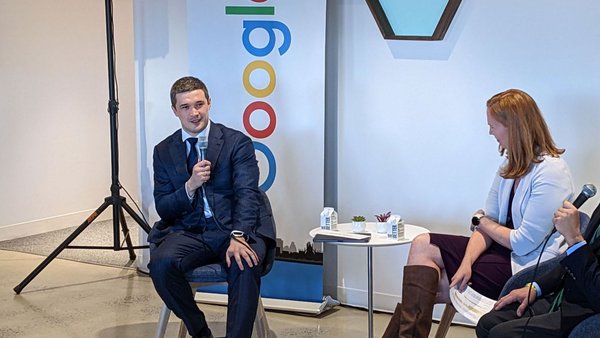That’s because in today’s mobile, hybrid environment, cybersecurity is a team sport. We are each only as strong as our weakest link. But when we work together, we spur innovation and advance best practices that benefit all.
I speak from some experience here, as Google’s services are attacked every day. And yet we keep more people safe than anyone else in the world. We do that by looking at security through a collective lens, leveraging open frameworks, and relying heavily on secure open-source software.
We hope to use what we have learned to help secure Europe’s “digital decade.”
To that end, we recently published a white paper with recommendations like investing in technology that’s secure by default; working with private and international partners on new areas of cooperation, and building security based on openness and interoperability.
These recommendations are based on first-hand experience. In 2009, Google was the victim of a major cybersecurity attack, code named Operation Aurora. We learned that transparency, coupled with security by design, was the best way to secure the digital ecosystem.
As we detail in our recently released docuseries, HACKING GOOGLE, Aurora changed everything. It spurred us to shift away from the old “perimeter defense” model of crunchy on the outside, chewy in the middle (with high outside walls but no interior defenses) to a zero-trust model in which all users, all devices, and all applications are continuously checked for security risks, and yet security comes easily and naturally for users.
After Aurora, we launched our Threat Analysis Group, or TAG, to spot, disclose, and attribute threats, whether they were coming from nation-state actors or commercial spyware and surveillance vendors. We also launched our Project Zero team to find and promptly disclose previously unknown zero-day vulnerabilities in our own and other companies’ software, raising the security bar for everyone.
It hasn’t always been comfortable work–but that kind of transparency is key to security. As the computer engineering saying goes, “with enough eyes, all bugs are shallow.”
Today, by adopting advanced security innovation and threat intelligence, we ensure vulnerabilities are fixed fast, before they can be widely exploited.
You can see our approach in action whenever TAG discloses a new threat. For example, in 2017, our Android operating system was the first mobile platform to warn users about NSO Group’s Pegasus spyware–“zero-click” malware designed to allow an attacker to compromise a smartphone without a user taking any action.
By sharing information early and widely, we raised awareness of this threat, helped victims understand if they were compromised, and promoted a greater focus on mitigations. Since then, TAG has continued to report on Pegasus and other commercial spyware tools, shining a light on this murky industry.
So when the war came in Ukraine, open security principles kept us one step ahead. Since the war began, we’ve sent thousands of warnings to users targeted by nation-state actors–another practice we pioneered after Aurora. We’ve succeeded in blocking the vast majority of the attacks. And we launched Project Shield, bringing not just journalists, but human rights organizations and even government websites in Ukraine under Google’s security umbrella against distributed denial of service attacks.
Because while it can be easy to DDOS small sites, it turns out that it’s pretty tough to DDOS Google.
We are all in on this collaborative approach to security. Currently, we are working with our team at VirusTotal to launch a new Google Safety Engineering Center in Málaga, Spain, which we hope will become a European hub for joint research on advanced threats.
 Applications now open for the Google for Startups Growth Academy for Cybersecurity, announced last fall in Madrid for European startups
Applications now open for the Google for Startups Growth Academy for Cybersecurity, announced last fall in Madrid for European startups
 Applications now open for the Google for Startups Growth Academy for Cybersecurity, announced last fall in Madrid for European startups
Applications now open for the Google for Startups Growth Academy for Cybersecurity, announced last fall in Madrid for European startups
 Recap of activities underway with publishers across Central and Eastern Europe in 2022
Recap of activities underway with publishers across Central and Eastern Europe in 2022
 Google announces new commitments and support for Ukraine
Google announces new commitments and support for Ukraine
 Google, YouTube and partners are joining with European policymakers, organizations and media in Brussels to discuss tackling misinformation.
Google, YouTube and partners are joining with European policymakers, organizations and media in Brussels to discuss tackling misinformation.
 Some love it for its crispy golden crust, others for the fluffiness of its crumbs, but the French all agree that the baguette is their favorite loaf. Indeed it’s so embe…
Some love it for its crispy golden crust, others for the fluffiness of its crumbs, but the French all agree that the baguette is their favorite loaf. Indeed it’s so embe…






